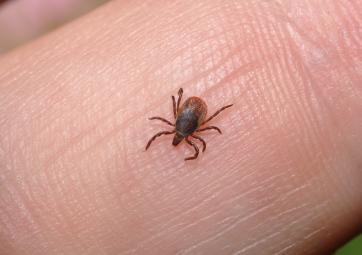Scientists at Northwestern Medicine recently made an exciting discovery regarding why there is a higher prevalence rate for women than men in multiple sclerosis (MS) and other autoimmune diseases. They found that the innate lymphoid cell, which is a type of white blood cell, works differently in males versus females.
Most labs that study MS use female mice because they are much more likely than male mice to get the disease. Typically, two groups of female mice are used: one group of normal mice used as a control group and one group of mice with a genetic mutation in a growth factor receptor, which blocks the development of a subset of immune cells. However, a graduate student in the lab made an honest mistake and used two sets of male mice instead of female mice. At the end of the experiment, the male mice who had the mutation were extremely sick, which led to the realization that the mutation was acting differently in females and males.
The mice with the mutation were found to lack type 2 innate lymphoid cells, which are normally present in bone marrow, lymph nodes, and the thymus of both females and males. These cells are not found in the males with the mutation, which leads to a drastic change in the immune response of the mice and means that they are not protected against MS. In the normal male mice, these lymphoid cells were activated and protected the mice from the disease.
While female mice have the same lymphoid cells that male mice do, they do not become activated and therefore do no protect them from developing MS. This discovery in the lab has led to the current investigation into why these cells are activated more so in males than females and subsequently if it is possible to activate them in females in order to reduce their vulnerability to contracting MS.
Background on MS
Multiple sclerosis is a disease in which your immune system attacks your central nervous system, which is made up of your brain, optic nerves, and spinal cord. More specifically, the protective layer (myelin) that covers your nerves is attacked and subsequently damaged, disrupting the crucial communication between your brain and the rest of your body. The distortion and disturbance of nerve impulses traveling to and from the brain generate a wide variety of symptoms, depending on which nerves are affected and how damaged they become.
Sources:
Original Publishes Findings in The Journal of Immunology
National Multiple Sclerosis Society

 A new slow-release formulation of peppermint 0il has been shown to reduce the severe abdominal symptoms of Irritable Bowel Syndrome (IBS) according to a study researchers at the U of Alabama. Peppermint has been used to relieve stomach problems for generations but this is a new look at an old remedy. The main component of peppermint oil is L-menthol which has properties that help with intestinal bloating, cramping, and infections. Until recently, the main source has been typically over-the-counter capsules or gel caps but the dosing has not been well regulated. Too much of the oil at the beginning of the GI tract can lead to heartburn and dyspepsia. Too much release at the end of the track can lead to lower bowel symptoms.
A new slow-release formulation of peppermint 0il has been shown to reduce the severe abdominal symptoms of Irritable Bowel Syndrome (IBS) according to a study researchers at the U of Alabama. Peppermint has been used to relieve stomach problems for generations but this is a new look at an old remedy. The main component of peppermint oil is L-menthol which has properties that help with intestinal bloating, cramping, and infections. Until recently, the main source has been typically over-the-counter capsules or gel caps but the dosing has not been well regulated. Too much of the oil at the beginning of the GI tract can lead to heartburn and dyspepsia. Too much release at the end of the track can lead to lower bowel symptoms. Planning on hiking, camping, or gardening this summer? If so, be careful of ticks and Lyme disease! The Centers for Disease Control and Prevention report that there were over 30,000 cases of Lyme disease in 2013, a number that is estimated to grow each year.
Planning on hiking, camping, or gardening this summer? If so, be careful of ticks and Lyme disease! The Centers for Disease Control and Prevention report that there were over 30,000 cases of Lyme disease in 2013, a number that is estimated to grow each year.
 Manicures and pedicures used to be reserved for special occasions but they have now become a staple for all ages of women across the economic spectrum.
Manicures and pedicures used to be reserved for special occasions but they have now become a staple for all ages of women across the economic spectrum.  This June, the Food and Drug Administration (FDA) will release a revision to prescription guidelines--the first since 1979. These new guidelines will provide up-to-date and specific information to doctors about the risks and benefits of medication that pregnant women may need to control other conditions. The rule of thumb over the years has just been to tough it out and not take any medicines that may (or may not) hurt the mother or the fetus. Research in this area is limited because pregnant women are excluded from most drug trials. Dr. Katherine Wisner, WHRI Leadership Council Member and expert on mood disorders at Northwestern U, "Pregnant women get sick and sex women get pregnant. But somehow we have created this myth of the medication-free pregnancy." We've all heard stories about pregnant women who have serious depression and stop their meds---harming themselves or their baby because their condition is out of control.
This June, the Food and Drug Administration (FDA) will release a revision to prescription guidelines--the first since 1979. These new guidelines will provide up-to-date and specific information to doctors about the risks and benefits of medication that pregnant women may need to control other conditions. The rule of thumb over the years has just been to tough it out and not take any medicines that may (or may not) hurt the mother or the fetus. Research in this area is limited because pregnant women are excluded from most drug trials. Dr. Katherine Wisner, WHRI Leadership Council Member and expert on mood disorders at Northwestern U, "Pregnant women get sick and sex women get pregnant. But somehow we have created this myth of the medication-free pregnancy." We've all heard stories about pregnant women who have serious depression and stop their meds---harming themselves or their baby because their condition is out of control.  Spring finally came to the Midwest this weekend and like many homeowners, it was time to check out my garden and see what perennials survived the long winter. As I washed up after clearing dead foliage, I ran my hand at the back of my head and felt a small "scab"...but soon found out it was a little reddish tick that had not yet embedded in my skin and was alive and well!!
Spring finally came to the Midwest this weekend and like many homeowners, it was time to check out my garden and see what perennials survived the long winter. As I washed up after clearing dead foliage, I ran my hand at the back of my head and felt a small "scab"...but soon found out it was a little reddish tick that had not yet embedded in my skin and was alive and well!! An estimated 300 million people worldwide are living with asthma, a chronic disease that inflames and narrows the airways of the lungs, causing wheezing, breathlessness, chest tightness and coughing. Globally, an estimated 15 million years of life are lost each year due to asthma-related disability or early death. Asthma is a leading cause of hospitalization and missed school and work days in the United States, and managing the condition can be costly for families and health care systems.
An estimated 300 million people worldwide are living with asthma, a chronic disease that inflames and narrows the airways of the lungs, causing wheezing, breathlessness, chest tightness and coughing. Globally, an estimated 15 million years of life are lost each year due to asthma-related disability or early death. Asthma is a leading cause of hospitalization and missed school and work days in the United States, and managing the condition can be costly for families and health care systems. Interesting in learning about men's health issues? Join Northwestern Medicine Physicians as they discuss men's health at a free seminar. Spouses and partners are welcome.
Interesting in learning about men's health issues? Join Northwestern Medicine Physicians as they discuss men's health at a free seminar. Spouses and partners are welcome. The percentage of women faculty at medical schools has greatly increased in the past two decades, but women are significantly underrepresented in leadership positions.
The percentage of women faculty at medical schools has greatly increased in the past two decades, but women are significantly underrepresented in leadership positions.